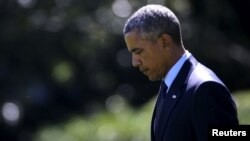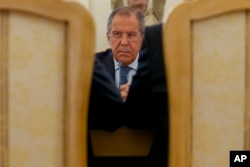President Barack Obama said Friday that Russian actions in Syria could prevent the United States and other members of the U.S-led coalition from getting to a political solution in Syria.
Obama said the United States would be engaging Russia about its strategy of providing increased military support to the Assad government in Syria.
"If they are willing to work with us, the 60-nation coalition that we put together, then there is the possibility of a settlement in which [Syrian President Bashar al-Assad] would be transitioned out and a new coalition of moderate secular and inclusive forces could come together and restore order in the country. That’s our goal," he said, adding: "This is going to be a long discussion."
A Pentagon official told VOA on Friday that Russia had sent 200 naval infantrymen to Syria, as well as modular housing for 1,500 troops. So far, the official said, most of what has been sent — howitzers, a short-range guided-missile controller and a dozen armored vehicles — appears to be defensive in nature.
Although Russia's expanded military support for the government in Damascus has aroused concern in the United States, Moscow said it hoped to avoid "unintended incidents" in Syria by "coordination" with the U.S.
Foreign Minister Sergei Lavrov said Friday in Moscow that "coordination" meant cooperating with the Syrian government and military.
"We have talked about it from the very beginning of action by this coalition led by our U.S. colleagues," he said. "We are still, better late than never, appealing to the members of the coalition to start cooperation with the Syrian government [and] Syrian army."
But the United States wants Assad gone. He "has alienated so much of the Syrian population that it will not be possible to arrive at a peaceful cease-fire and political settlement" as long as he is there, Obama said, adding that the U.S. would continue to go after Islamic State "very hard."
Lavrov said the hundreds of airstrikes launched by the United States and its partners would not be able to suppress and disperse the Islamist fighters, who control a large portion of Syrian and Iraqi territory.
The foreign minister reiterated that Russia intended to continue shipping weapons to Syria, in compliance with international law, to bolster the Assad government's defenses.
Lavrov said U.S.-Russian military cooperation in and around Syria should resume because it would be in both sides' interests.
"We always support the idea of military forces talking to each other," the Russian diplomat said, because "they understand each other well [and] this is important for avoiding unwanted unintentional incidents."
Syria's conflict between anti-government demonstrators and government forces began in March 2011, and after a bloody crackdown by Assad regime, it escalated into a civil war that has left more than 250,000 people dead and nearly 5 million displaced.






